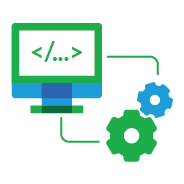The demand to increase the rate of software delivery among business stakeholders led to the collaboration of two critical teams – Development and Operations. From encouraging communication among software developers and IT operations to enhancing the speed and quality of delivering the software, DevOps is bridging the gap between the two.
While some say it is the environment, some prefer calling it a ‘culture’ or a ‘mindset.’ We believe it is an alignment that encompasses crucial business users, developers, test engineers, security engineers, and system administrators, integrated into a single, highly automated workflow with a shared focus.
Application of the DevOps principles has resolved many dilemmas in an organization. By subscribing to a standard set of goals, the team/individual eliminates repetitive processes and minimizes downtime and redundancy. Experts even claim that USD 40 billion companies made significant improvements by using DevOps principles.
What is the Role of a DevOps Engineer?
It is often challenging to pin-point the precise role of a DevOps Engineer, not because it is one of the most challenging roles in the current dynamic workforce, but because it is still evolving. Currently, it is a hybrid with both technical and non-technical skills in equal measure.
With a DevOps Engineer, one team or an individual seamlessly manages/liaison with the entire application development lifecycle. They are responsible for features, fixes, and frequent updates, tightly synced with business objectives, integrity, and stability of the system.
Complete transparency and seamless communication enable DevOps teams/engineers to minimize downtime and resolve issues faster, with greater efficiency, innovation, and delivery with value to businesses and customers.









 Behavioral Competencies
Behavioral Competencies Cognitive Competencies
Cognitive Competencies Coding Competencies
Coding Competencies Domain Competencies
Domain Competencies




































Would you like to comment?